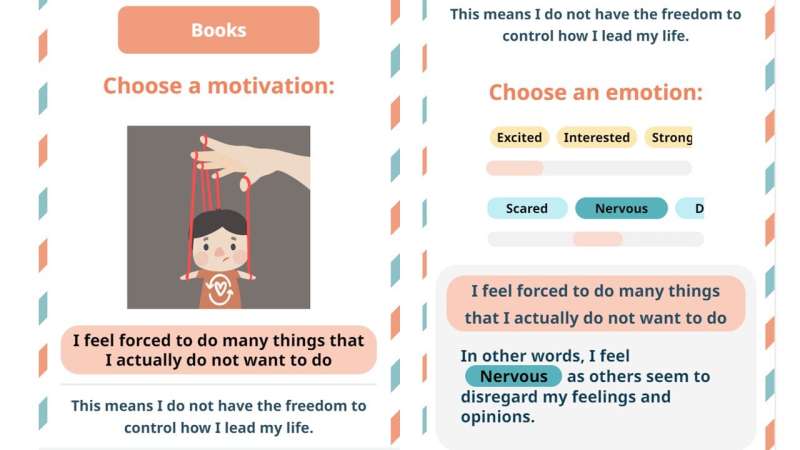This article has been reviewed according to Science X's editorial process and policies. Editors have highlighted the following attributes while ensuring the content's credibility:
fact-checked
trusted source
proofread
Digital peer emotional support improves youth well-being: Study

Emerging adulthood (ages 19 to 25 years) is a developmental phase that is marked by increased mental health conditions, especially depression and anxiety. Online peer emotional support is one mental health intervention that has demonstrated positive implications for the psychological well-being of emerging adults in current research literature.
In a study led by the Institute for Digital Medicine (WisDM), Yong Loo Lin School of Medicine, National University of Singapore (NUS Medicine), and digital peer support platform, Acceset, it was found that peer support via a digital platform enhanced the well-being of youth, with reduction of self-reported depression and anxiety symptoms after the intervention.
Of note, digital peer support lowered depressive and anxiety symptoms in emerging adults following intervention, by nearly 40%, compared to symptoms prior to intervention. The effect of the intervention was sustained beyond the period of the intervention, for approximately six weeks.
Dr. Yeo Geck Hong from WisDM at NUS Medicine, Principal Investigator of the study, said, "Our study has shown evidence demonstrating the positive effects of web-based or online peer support in enhancing the well-being of young adults. These results lend insights into the development of community-based strategies and interventions in meeting the increasing mental health needs of the population."
In the study, 130 tertiary-level students were recruited and split into two groups—30 befrienders, who provided peer support, and 100 seekers, who received peer support. Over 21 days, these befrienders and seekers interacted via Acceset, a digital peer support platform that facilitates the interpersonal sharing. Through the platform which provided a guided writing process, seekers anonymously shared their emotional experiences and received support responses from the befrienders, who were guided by two certified counselors.
The protocols around risk-management and timely stepping up or down of care were developed by the study team, clinicians and platform provider in the research design, approved by the NUS ethics review board, and implemented in the delivery of the digital peer support intervention during the study.
Professor Dean Ho, Director of WisDM at NUS Medicine, and co-Principal Investigator of the study, said, "The unique feature of our intervention method is that students received support from their peers with common lived experiences, with the involvement of certified clinicians and counselors, who trained peer supporters and moderated their responses. This model of care enables knowledge sharing and transfer between clinicians and students, and draws on resources from the community in providing students with digital peer support to cope with daily life stressors."
Through the comparison of letter exchange on the Acceset platform and self-reported depression and anxiety symptoms before and after the 21 days of intervention, it was found that both seekers and befrienders benefitted from digital peer support in terms of cultivating psychological skills of well-being.
Specifically, based on a four-point scale ranging from "not at all" to "a lot," the study observed greater selfhood, which refers to the recognition of one's needs, thoughts, feelings, and behaviors; increase in compassion, which refers to greater sensitivity towards one's and others' life circumstances; and greater mindfulness, which refers to flexibility in thinking.
These positive effects on well-being were sustained over the longer term, based on results derived from subsequent follow-up assessments at six weeks and nine weeks after the intervention period.
Regarding selfhood, the seekers' selfhood development increased by 25% after intervention, and the increase was sustained at follow-up assessments. Regarding compassion, the seekers' compassion increased by 76% after intervention, and increased modestly at follow-up assessments.
Regarding mindfulness, the seekers experienced a 90% increase in mindfulness after intervention, which continued to increase at the six-week follow-up assessment. However, mindfulness decreased slightly at nine weeks, providing guidance for future studies to determine the optimal duration and frequency of intervention.
Matt Oon, Chief Executive Officer of Acceset said, "The Acceset platform—which is like a digital journal—incorporates characteristics of successful interventions that affect the psychological well-being of emerging adults. Incorporating a combination approach to facilitating digital peer support, the platform first provides users with prompts to encourage writing, and digital emojis and accompanying descriptions of each to encourage emotional disclosure. The letter-writing process is also user-friendly and notifies befrienders to respond in a timely fashion, an outcome that was observed in the study as well."
Beyond the study, the team hopes that future studies can consider how different target groups such as adolescents, the elderly, healthcare providers, and other sectors may benefit from the engagement of community-based peer support to improve population mental health and well-being.
The paper is published in the journal JMIR Mental Health.
More information: GeckHong Yeo et al, A Digital Peer Support Platform to Translate Online Peer Support for Emerging Adult Mental Well-being: Randomized Controlled Trial, JMIR Mental Health (2023). DOI: 10.2196/43956




















